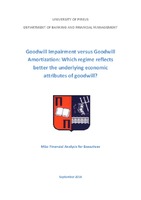Goodwill impairment versus goodwill amortization : which regime reflects better the underlying economic attributes of goodwill?

Master Thesis
Συγγραφέας
Περιστέρης, Κωνσταντίνος
Peristeris, Konstantinos
Ημερομηνία
2016-09Επιβλέπων
Μπότσαρη, ΑντωνίαΠροβολή/
Λέξεις κλειδιά
Υπεραξία ; Διεθνή λογιστικά πρότυπα ; Αποσβέσεις ; Απομείωση ; Goodwill ; Amortization ; Impairment ; IFRSΠερίληψη
Ο υπολογισμός της υπεραξίας έχει υπάρξει επίμαχο και αμφιλεγόμενο θέμα ανάμεσα στους ερευνητές και τους ακαδημαϊκούς, όπως και για τους επενδυτές, δεδομένου των δυσκολιών για τον ορισμό, τη μέτρησή και την αξιολόγησή της. Αυτός ο διάλογος έγκειται κυρίως στις αντικρουόμενες απόψεις σχετικά με το ποιο λογιστικό καθεστώς (απόσβεση vs απομείωση) αντανακλά καλύτερα την επίδραση στη τιμή μιας μετοχής. Ο σκοπός αυτής της διπλωματικής εργασίας είναι να ερευνήσει τη χρησιμότητα της υπαραξίας και τις ακόλουθες λογιστικές μεθόδους με σκοπό να λάβουμε πληροφόρηση για την διαπραγματευτική αξία των επιχειρήσεων. Πρέπει να λάβουμε υπ’ όψη πως βάσει των Διεθνών Λογιστικών Προτύπων πως η λογιστική αντιμετώπιση της υπεραξίας άλλαξε το 2005 και ο τρόπος που πλέον αντιμετωπίζεται είναι μέσω των ελέγχων απομείωσης οι οποίοι αντικατέστησαν το καθεστώς της απόσβεσης. Για την έρευνα, χρησιμοποιήθηκε η panel data μεθοδολογία σε συνολικό δείγμα 264 Γερμανικών εταιρειών για την περίοδο 2000 έως και το 2010. Σύμφωνα με ερευνητικά ευρήματα, τα αποτελέσματα για το αν το καθεστώς της απομείωσης καταγράφει καλύτερα την αξία σε σχέση με την απόσβεση είναι σαφή, επισημαίνοντας πως οι επενδυτές λαμβάνουν υπόψιν τη λογιστική πληροφορία που τους δίνεται μέσω της υπεραξίας. Αντίθετα, δεν βρίσκουν την απόσβεση χρησιμότερη στην αξιολόγηση των χρηματιστηριακών τιμών και αυτός είναι και ο λόγος που δεν τους επηρεάζει στη διαδικασία λήψης αποφάσεων.


